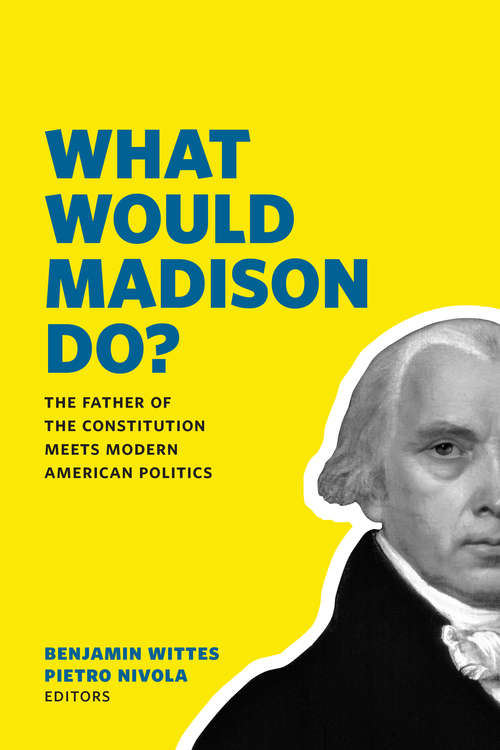What Would Madison Do?
By: and
Sign Up Now!
Already a Member? Log In
You must be logged into Bookshare to access this title.
Learn about membership options,
or view our freely available titles.
- Synopsis
- What would the father of the Constitution think of contemporary developments in American politics and public policy?Constitutional scholars have long debated whether the American political system, which was so influenced by the thinking of James Madison, has in fact grown outmoded. But if Madison himself could peer at the present, what would he think of the state of key political institutions that he helped originate and the government policies that these institutions produce? In What Would Madison Do?, ten prominent scholars explore the contemporary performance of Madison's constitutional legacy and how much would have surprised him.John DiIulio Jr. (University of Pennsylvania) observes the failure of today's policymakers to address adequately the nation' s long-range financial liabilities.William Galston (Brookings Institution) examines the implications of the rise of political parties and the ascent of "direct versus representative democracy."Pietro Nivola (Brookings Institution) makes the case that the American political system actually acquitted itself comparatively well in contending with the recent Great Recession.R. Shep Melnick (Boston College) challenges the common presumption that the U.S. government is gridlocked.Jonathan Rauch (Brookings Institution) argues that America's political process continues to encourage useful compromise, much as Madison intended.Jack Rakove (Stanford University) ponders what Madison would think of the contemporary U.S. Senate.Martha Derthick (University of Virginia) contemplates the current federal government's extensive involvement in the concerns of states and localities.Eugene Hickok (former deputy secretary of education) discusses Madison's devotion to education and invites us to wonder how he might view the educational system's current condition.Lynn Uzzell (Robert H. Smith Center for the Constitution at James Madison's Montpelier) reflects on how Madison might have regarded the judicial role in resolving constitutional disputes such as those stirred by laws such as the Affordable Care Act.Benjamin Wittes (Brookings Institution) and Ritika Singh (Lawfare) look at the age-old tension between national security interests and safeguarding civil liberties.
- Copyright:
- 2015
Book Details
- Book Quality:
- Publisher Quality
- ISBN-13:
- 9780815726586
- Related ISBNs:
- 9780815726579
- Publisher:
- Brookings Institution Press
- Date of Addition:
- 09/14/15
- Copyrighted By:
- The Brookings Institution
- Adult content:
- No
- Language:
- English
- Has Image Descriptions:
- No
- Categories:
- History, Nonfiction, Philosophy, Politics and Government
- Submitted By:
- Bookshare Staff
- Usage Restrictions:
- This is a copyrighted book.
Reviews
Other Books
- by Pietro S Nivola
- by Benjamin Wittes
- in History
- in Nonfiction
- in Philosophy
- in Politics and Government
